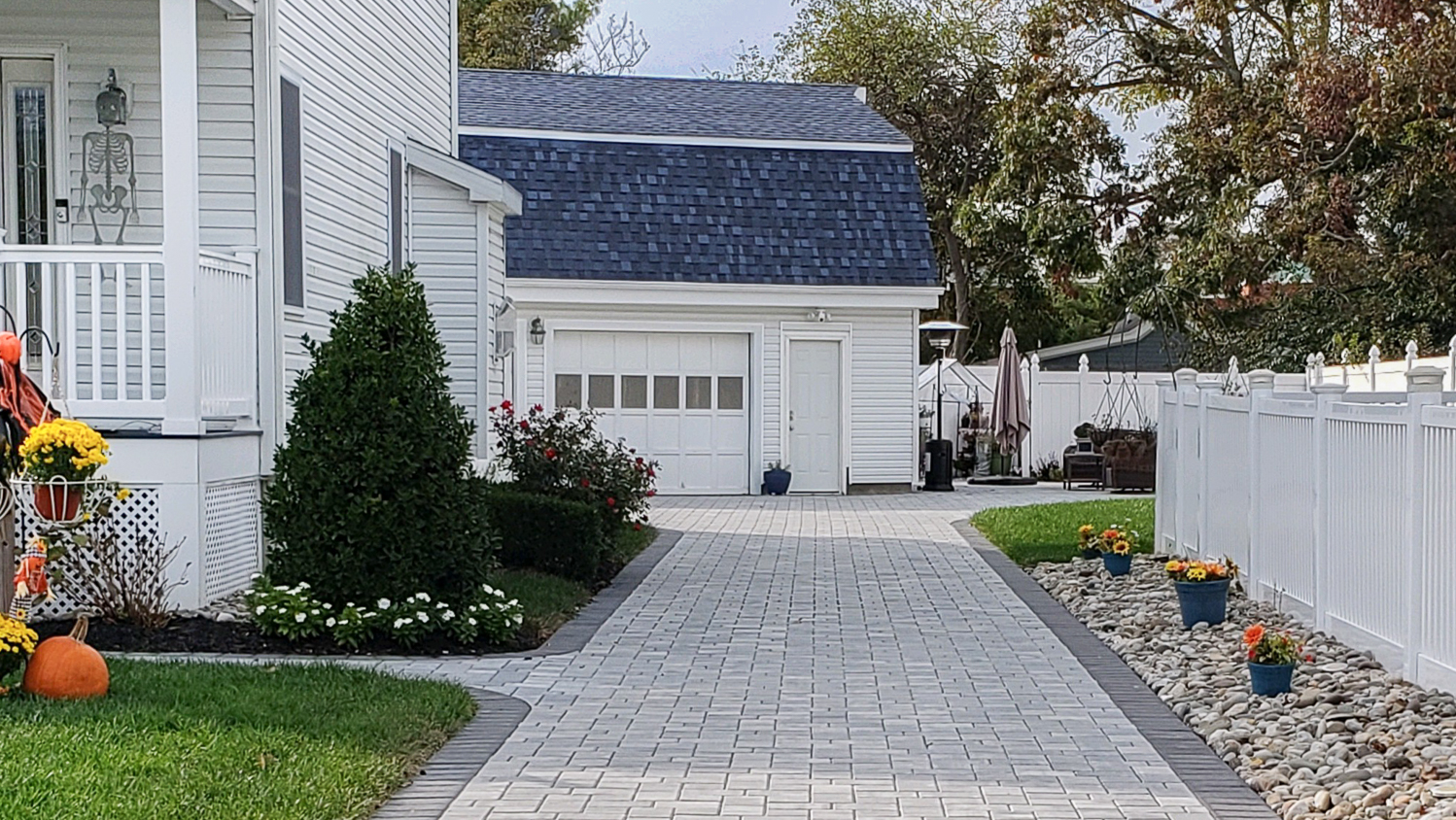
Discover the average paver driveway cost, including price ranges, key cost factors, and tips to help you budget for your driveway project.
Pave the way for some serious curb appeal


If you’re tired of parking on the street or dodging holes in your aging driveway, you may be considering a freshly paved path to park your car. Paving a driveway is an instant upgrade to any home, but it requires a lot of upfront investment, specialized skills, and heavy equipment to install, plus ongoing maintenance. While most homeowners should leave this job to a local driveway paving company, you can learn how to pave a driveway to better understand the process and what to expect from the company you hire to do the job.
Particularly handy, homeowners who have similar experience can typically handle this job themselves in a few days to a week. Read on for our step-by-step guide on how to pave a driveway.
Before you can learn the step-by-step details of how to pave a driveway, you’ll need to take some precautions. One of the most important steps is surveying your property for utility lines, and you’ll also need to remove the surface—whether it be old asphalt, concrete, pavers, or just grass—where you plan to pave.
You’ll need to do some demolition and digging to pave a driveway, so it’s important to call 8-1-1, the national number to call before digging underground, to have a professional check for utility lines before you start this project. An expert can flag or mark areas where utility lines or pipes are underground.
If you have extensive driveway paving experience and access to the heavy machinery needed to complete this job, you may be considering DIYing. If so, you’ll need to purchase the right paving materials at a home improvement store, like fresh asphalt, for your driveway. Otherwise, you can discuss your options with the driveway installation company you are working with.
Building projects of this size typically require a permit. You will need to contact your local building department, prepare supporting documentation, submit the application, and wait for approval before you can start your project. Permit fees vary, but expect to pay between $150 to $2,000, depending on your project and jurisdiction.
It’s best to remove any old concrete or pavers if you are paving a driveway if you want a smooth, sturdy surface. You’ll need heavy equipment, like power graders and rollers or compactors, to get this done, and it’s best to hire a local demolition company near you to get this job done safely.
In some cases, you can repave over an existing asphalt driveway. If your asphalt driveway has minor cracks or holes, you can repair these areas before paving a new surface. You can fill cracks and small holes with asphalt sealant, then continue on with the steps to pave a driveway.
A driveway needs to be properly graded and sloped to help rainwater drain away. The soil base of the driveway will need to slope downward toward the road or on the sides to help water drain and prevent the driveway from buckling. The driveway should slope about 1/4 inch per foot. A driveway paving professional will use a power grader to get the grading just right.
Just like your house needs a durable foundation, your driveway is only as good as its base layer. At this stage, the pros may need to lay new soil before adding the sub-base, which provides stability and resistance to frost and freezing temperatures. The subsoil or sub-base will need to be compacted with a double drum roller.

The asphalt binder is an asphalt mixture with a higher amount of larger stones compared to smoother, finer asphalt top. This layer is designed to add more durability as the load-bearing layer.
The asphalt top is an aggregate of finer particles, making it less porous compared to the binder layer. The pros will need to truck the asphalt into the job site, then use an asphalt paver or applicator machine to apply the asphalt over the binder. The paver ensures a smooth application, although you can use asphalt shovels to apply asphalt in small spaces and tight corners. After applying the asphalt with an asphalt paver machine, rake it for an even surface, then use a compactor before moving on to the next step.
The transitional areas are where the driveway meets the walkway to your door, the sidewalk, and/or the road. You’ll need to install butt joints where these areas meet. Make sure these transitional areas are graded for proper drainage and are comfortable to walk or drive over.
For a cleaner look, you can apply a border around the driveway edges using paving stones or concrete. You could also add gravel around the edges of the driveway as an added cushion for any vehicles that may go off the sides of the asphalt.

Sealing an asphalt driveway adds more protection against the elements and can help your driveway last longer before it needs to be resurfaced or replaced. While demolishing the old driveway and laying new asphalt will take about seven working days, you need to wait an additional three to six months for the asphalt to fully cure, or harden, before applying sealant.
Paving a driveway requires special, heavy equipment at nearly every step of the process, from demolishing the old driveway surface to laying fresh asphalt. If you attempt this project yourself, you could end up with a weak driveway, or worse, you could damage your home’s foundation. Instead, hire a local driveway paving pro to get the job done safely, efficiently, and correctly.
Paving an asphalt driveway costs $2,500 and $6,600 with a professional. Although you can save up to $7 per square foot to DIY, you’ll spend about $500 per day on equipment rentals for machinery like jackhammers, rollers, and graders. Also, keep in mind that if done incorrectly, driveway repairs can be expensive. Expect to pay up to $5,000 in driveway repair costs or similar prices to repave a driveway.
There are some smaller project tasks you can tackle to bring down professional labor costs, including:
Demolition and removal of materials
Clear the area of obstructions
Secure necessary permits
Rolling up your sleeves and paving your driveway might seem like a rewarding and cost-effective project, but it’s not for the faint of heart. While saving money and having full control over the process is appealing, the physical labor, time commitment, and risk of mistakes can have you thinking twice. Here’s a closer look at the pros and cons:
Cost Savings: Professional paving isn’t cheap. The biggest reason homeowners opt for DIY paving is to cut labor costs. Professional driveway installation can be expensive, so handling the work yourself means you only pay for materials.
Control Over Materials and Process: Doing it yourself means total creative control. You can choose specific materials, patterns, and finishes to match your home’s aesthetic without relying on a contractor’s preferences or limitations.
Flexible Scheduling: Instead of working around a contractor’s availability, you can pave at your own pace. This flexibility allows you to fit the project into your free time.
Physical Demands and Skill Requirements: Paving is labor-intensive and requires knowledge of proper techniques. Heavy lifting, repetitive motions, and long hours on your feet can be physically exhausting.
Potential for Costly Errors: A poorly paved driveway won’t last. Mistakes like improper grading or compaction can lead to cracks, settling, and drainage issues—which can be expensive to fix.
Equipment and Tool Investment: Paving isn’t a job you can do with basic tools. You’ll need a plate compactor, asphalt rake, and possibly a paver machine, and renting or buying these adds to the cost.
Warranties and Liability Concerns: Professionals offer warranties on their work, while DIY paving comes with no guarantee. If your driveway fails, the repairs are entirely on you. Any accidental damage to your property—like misjudging a slope and causing water to drain toward your home—is also your responsibility.
If you’re confident in your skills, prepared for the labor, and willing to invest in the right tools, a DIY driveway could be worth it. Otherwise, hiring professionals might save you more trouble in the long run.
From average costs to expert advice, get all the answers you need to get your job done.

Discover the average paver driveway cost, including price ranges, key cost factors, and tips to help you budget for your driveway project.

Use our guide to calculate the cost to seal an asphalt driveway. Prices vary based on the type of sealant and the size of the driveway.

Do you need more parking for your business or home? Here's everything you need to know about the cost to pave a parking lot.

Want to know the best time to seal a driveway? Our guide will help you determine when to seal your driveway—and when it’s a bad idea.

Give your poor mom’s back a break and fix driveway cracks as they appear. The process may be easier and more affordable than you think. Learn more.

Pooling water can deteriorate your driveway faster while negatively impacting the landscape. Use this guide to explore drainage solutions to keep your driveway in great shape.